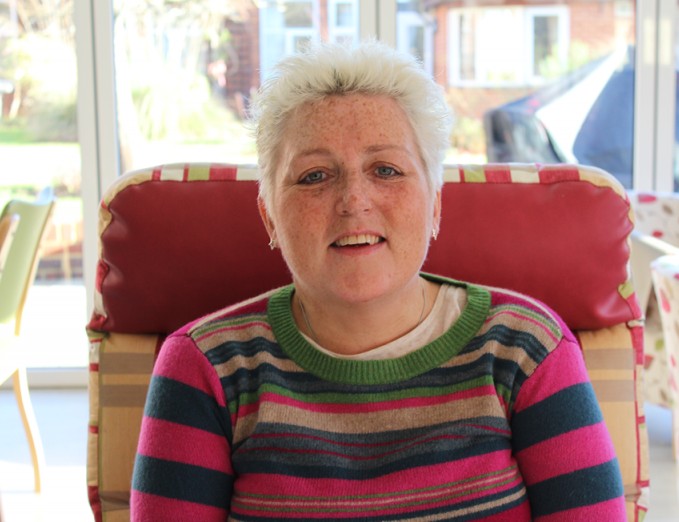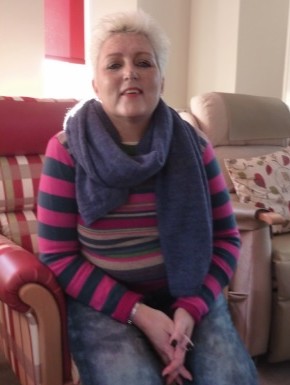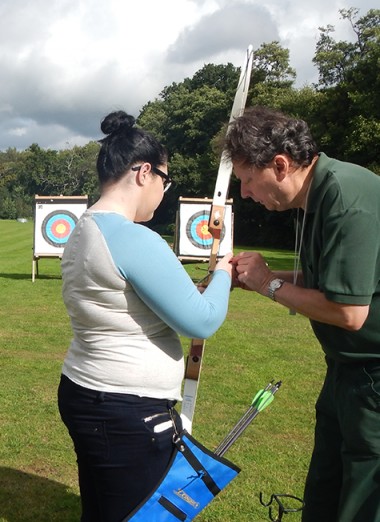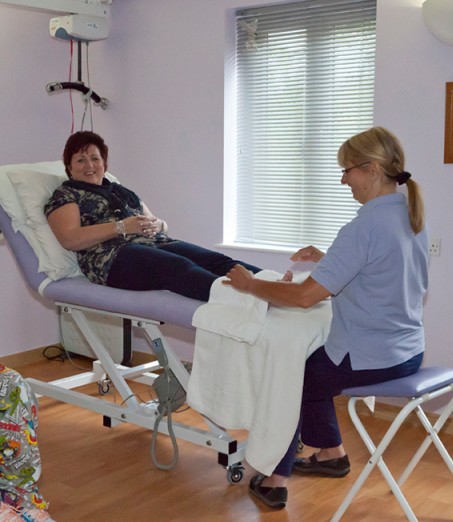Over 100 prizes to be won every week!
- 1st Prize: £1,000
- |
- 2nd Prize: £100
- |
- 3rd Prize: £50
- |
- 20 x £10
- |
- 80 x £5
Shonagh’s Story – Supported by Phyllis Tuckwell
09 December 2021
Shonagh, 42, who is married to Andy and has a 14 year old daughter, was first diagnosed with cancer in 2008.
“It was primary breast cancer,” she says. “I had all the treatment that was required and everything was normal, really. During my radiotherapy I even managed to go back to work. I was fine for almost two years, but then I started getting quite violent headaches.”
Shonagh underwent various tests as doctors tried to determine what was causing her headaches, but as she still had regular tests to check that her cancer hadn’t returned, nobody suspected that may be their cause. Shonagh was referred for an MRI scan, and arrived at the hospital planning to go out for dinner with her husband and daughter afterwards. However, the scan revealed a tumour at the base of her skull which gave doctors an answer to the headaches. Shonagh had secondary breast cancer.
“I was kept in overnight,” she remembers. “They were concerned about my spinal cord more than anything, at that point. But I managed to get out of hospital the next morning.” Shonagh saw her doctor the following day and by the end of the week had started a two-week course of radiotherapy.
“Since I’ve been diagnosed with secondaries I’ve had to make a decision about work,” she says. “I had been a matron of psychiatric in-patient units, so my job was quite stressful and intense. I had to think about whether I was going to be able to work full time or not, and with the advice of occupational health I decided to take ill health retirement. So in that respect my life has changed dramatically, going from working full time to being at home full time. But having had periods of ill health since then, I understand now how important it is for me to be at home and actually look after myself, because I wouldn’t have been able to work at that level and stay well.”
With hormone treatment and other medication, the tumour at the base of Shonagh’s skull stayed relatively stable for three years. However, in September 2013 she underwent more scans which showed that the cancer had become active again in her skull, and had also spread to her spine, ribs, liver and abdomen.
Following nine months of weekly chemotherapy, which held the cancer for a time, Shonagh was exhausted, and needed a break from the treatment. She was put on oral chemotherapy drugs which she was able to take at home, and which she found much easier.
“Managing the side-effects and the pain have been the biggest factors for me,” she says. “One of the ways in which I do this is by seeing the reflexology therapists at the Hospice. Being able to access support from the Hospice is very important. I know that I can pick up the phone and be able to speak to someone if I have any worries about any of my health problems or medication, or if I need any advice. They always understand, and there’s always someone there at the end of the phone.”

When asked about how her illness has affected her family, Shonagh thinks first of her daughter. “My daughter is 14 now, and she has been on this journey with us since she was eight. At times she says she doesn’t remember anything different to how it is now. I think it’s had a huge impact on her and Andy, especially when I’m re-diagnosed with further deterioration.”
In the past Shonagh, Andy and their daughter have always spent their Christmases with their extended family, either inviting them over or going to visit them. “There’s normally quite a group of us together,” she says. “I love the decorations of Christmas, and seeing the excitement on children’s faces. It’s all about children, this time of year. But this Christmas will be quiet. We’ll spend it with family – my husband’s family live nearby so we’ll invite them over and spend the day here at home. Having time together as a family is important.”
Shonagh’s happiest memories of past Christmases are from when her daughter was younger. She smiles as she remembers “watching her wake up and unwrap her presents like a tornado, so excited about what Santa had brought her. He gave her a little playhouse one year – she wasn’t quite two years old, and she had her little wellyboots on, and she went outside to see it. She was so excited that she banged on the little plastic window so hard that she broke it!”
“My wish this Christmas is to be at home with my family,” Shonagh says. “And in order to be able to do that I need to utilise the resources which the Hospice offers, like the reflexology and other complementary therapies, and the nurse-led team, who support me.”
Shonagh hasn’t started preparing for Christmas this year yet though. “There’s so much in the shops already, but I just can’t bear the thought of it,” she confesses. As the side-effects of her illness vary from day to day, Shonagh has to take one day at a time. “Every day is different,” she says. “My back was fine yesterday, and today I woke up and it was sore. For me, each day is a different day.”
“Last year one of the things I’d not done was to go up into town and see the lights, so we drove up and it was lovely, really nice. My hopes for the future are that this chemo works, and slows the progression of my disease down, so that I can have some more time with my family and watch my daughter grow up.”

“Since I’ve been having health problems I’ve attended quite a lot of different groups at the Hospice. I’ve seen the nurse-led teams and they’ve been fantastic. I’ve attended the Brush With Art group on a number of occasions, and I wouldn’t say I had an artistic bone in my body, but actually I had drawn some pictures which I was really pleased with! I’ve also had hand massage and attended some spiritual groups, which the vicar led at the Hospice. I’ve also made some oils and creams for massage – there was a whole host of different groups, and they’ve all helped. They’ve also introduced me to other people, not all of whom have cancer but have chronic health conditions which have impacted significantly on their lives. I find talking to other people helps, most of the time. It depends on how I’m feeling – if I’m in a lot of pain and discomfort then I find it more difficult to talk to people, as I’m focusing on dealing with my pain.”
Shonagh’s daughter has also recently started attending Storm – a Hospice-run therapy group for teenagers who have been affected by a terminal illness. “She’s keen to go,” says Shonagh. “It’s an opportunity for her to spend time with peers who have family members with significant health problems. And I’m happy knowing that she’s with other people who are in a similar situation.”

When asked how she feels about the Hospice, Shonagh says “I knew about it before coming here. Having worked in the local community before, I knew what it provided. In fact, just two weeks before I was diagnosed with secondaries, I did Steps Under the Stars to raise money for the Hospice. It was ironic that a fortnight later I was there using their services myself. I was really surprised at how different it was when I went there though. My expectations were that it was a sad place; somewhere for people to die, but it’s not that place at all. It’s a place which helps people to live.”
Over 100 prizes to be won every week!
- 1st Prize: £1,000
- |
- 2nd Prize: £100
- |
- 3rd Prize: £50
- |
- 20 x £10
- |
- 80 x £5

